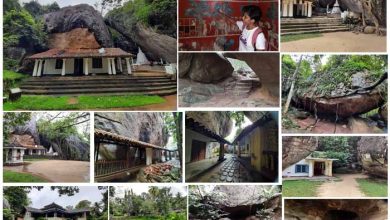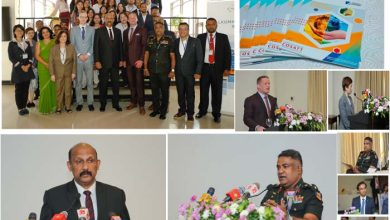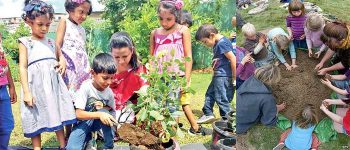Multi-Track Diplomacy for Controlling the Global Pandemic: Coronavirus COVID 19:
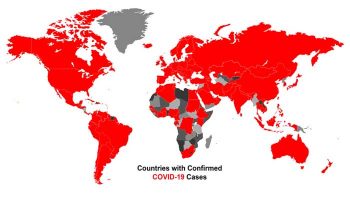
By
Dulaja Nuwandi Silva and Prof. (Dr)DAC Suranga Silva
After the WWII, the Coronavirus COVID-19 outbreak has become the most devastated disaster for human and its socio-economic development in the world. By now (5th April 5, 2020), no of Coronavirus Cases are 1,203,859 and deaths are 64,787 people spreading nearly 200 countries in
Coronavirus disease (COVID-19) is a new strain that was discovered in 2019 and had not been previously identified in any human. This virus can be named as a zoonotic. Which means, they have been transmitted between animals and people. Detailed investigations found that SARS-CoV was transmitted from civet cats to humans and MERS-CoV from dromedary camels to humans. Several known coronaviruses are circulating in animals that have not yet infected humans. Common signs of infection include respiratory symptoms, fever, and cough, shortness of breath and breathing difficulties. In more severe cases, infection can cause pneumonia, severe acute respiratory syndrome, kidney failure and even death. Standard recommendations to prevent infection spread include regular hand washing, covering mouth and nose when coughing and sneezing, thoroughly cooking meat and eggs.
On 30th Jan 2020, World Health Organization has declared it as a Public Health Emergency of International Concern (PHEIC). On 11th Feb 2020, the WHO has introduced a short form for the diseases as COVID-19 and on 11th March 2020, the WHO declared as pandemic. On 31st March, Important World’s Agency Chiefs, the heads of the World Trade Organization (WTO), the UN Food and Agriculture Organization (FAO) and the World Health Organization (WHO) issued a joint statement calling on governments to minimize the impact of COVID-19 related border restrictions on trade in food. “Now is the time to show solidarity, act responsibly and adhere to our common goal of enhancing food security, food safety and nutrition and improving the general welfare of people around the world,”
Reflective Diplomatic Relation for Controlling COVID-19
Diplomatic relationship in the Asia Pacific show that countries respond to disasters in line with their existing political alliances. This pattern is called by many experts as “Disaster Diplomacy,”
Disaster diplomacy can be evidenced after Taiwan’s earthquake and during the Maldives’ state of emergency, as leaders made nuanced overtures in search of help from India, China, and Japan.
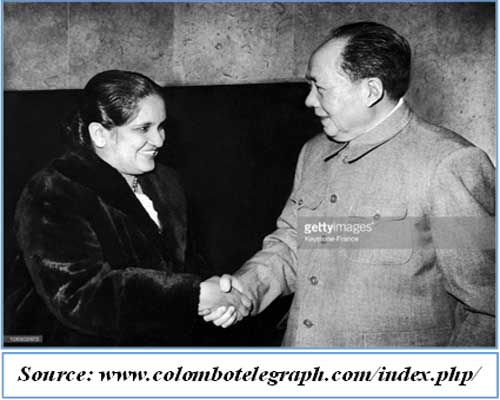
On a request made by the Sri Lankan government China has urgently provided a concessionary loan of US$ 500 million with a term of 10 years, to help Sri Lanka financially to better respond to the current COVID–19 pandemic. China Development Bank and Sri Lanka’s Ministry of Finance signed the 500 million US dollar loan agreement in Prime Minister Mahinda Rajapaksa’s Office, the Chinese Embassy in Colombo. As Prime Minister Rajapaksa said the friendship between Sri Lanka and China has a long history, and they are true friends in distress and suffering, and have stood the test of history.
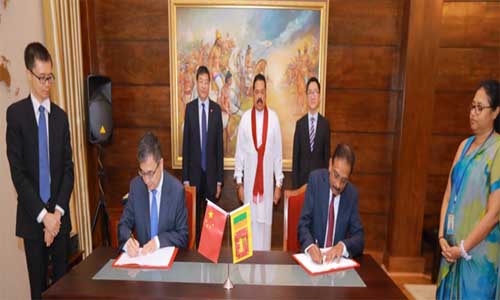
China has provided tremendous helps to Sri Lanka’s economic and social development since 1950. Even before, China has a long history of relations with Sri Lanka that date back to the 4th century AD, when the Chinese monk Faxian visited Sri Lanka. In the 20th century, relations with China were renewed following Sri Lanka’s recognition of the People’s Republic of China in January 1950. Sri Lanka also supported China’s accession to the United Nations. Sri Lanka and China entered into the historic Rubber-Rice barter in 1952.
Sri Lankan government and people have a strong expectation on China’s contribution this COVID 19 crisis as well. Consequently, Chinese national leaders, the government of China and related financial institutions, in their efforts to fight against this coronavirus pandemic, energetically responded to Sri Lanka’s urgent financial and anti-epidemic needs, and made special arrangements as soon as possible. Moreover China has donated 100,000 masks including 10,000 N95 masks and 20,000 test kits to Sri Lanka in the coming days.
On the other hand, the relationship between India and Sri Lanka is more than 2,500 years old. Both countries have a legacy of intellectual, cultural, religious and linguistic interaction. The Representative Office of Sri Lanka, then known as Ceylon, was established in New Delhi, India, in 1942. Diplomatic relations between the two countries were established in 1948, after the independence of Sri Lanka.
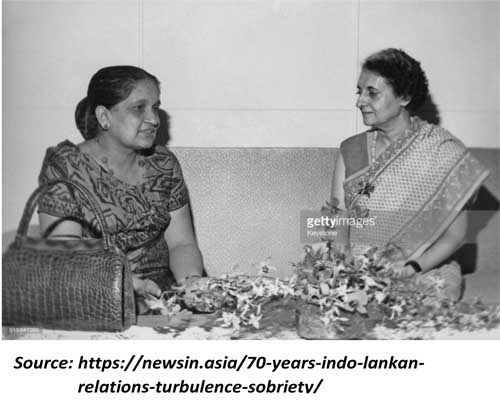
The High Commission of Sri Lanka in New Delhi and the Deputy High Commission of Sri Lanka in Chennai, in consultation with the Ministry of Foreign Relations and the Ministry of Buddha Sasana, are effectively coordinated and facilitated the arrangements for the early return of Sri Lankan Buddhist Pilgrims in India and Sri Lankan students in India. There were approximately 1200 Sri Lankan Buddhist pilgrims belonging to 22 tour groups currently in India. However, these numbers, secured by contacting Sri Lankan Buddhist temples in India and tour groups themselves, may have some duplication in certain instances, given that some tour groups are on the move. Sri Lanka Diplomatic Missions were closely in touch with the Buddhist monks at the Buddhist pilgrimage sites in North India and the tour groups themselves. The tour groups have been requested to expedite their return travel arrangements in view of the evolving situation. Most of these pilgrims are scheduled to return through New Delhi and Chennai to Sri Lanka at their earliest as possible. The Diplomatic Missions have facilitated their return travel including through discussions with the relevant airlines, with a view to rescheduling of tickets.
In addition, Government of Australia in partnering with WHO provided to support the Sri Lankan Government to fight against COVID-19. On 20th March 2020, Government of Australia officially provided the WHO with a contribution for the implementation of COVID-19 Preparedness and Response activities in Sri Lanka. The Ministry of Health is expected use this funds to implement with WHO support for three areas: (1) Surveillance, rapid-response and case investigation (2) Case Management and (3) National Laboratories
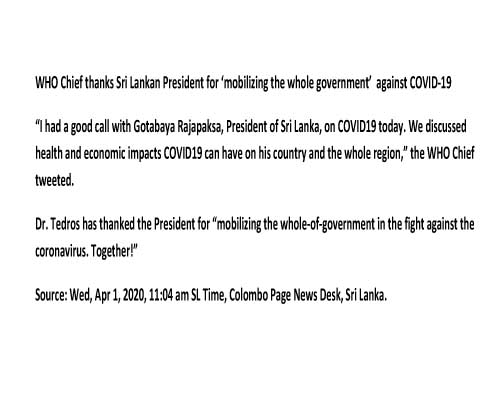
The Asian Development Bank (ADB) has allocated a $600,000 grant from the Health System Enhancement Project to the Government of Sri Lanka to finance preventive and response efforts to fight a potential novel coronavirus (COVID-19) outbreak in the country (https://www.adb.org/sectors/health/main). The global public health emergency, which has now been characterized by the World Health Organization as a pandemic, calls for urgent measures to respond to the COVIC 19 disease in Sri Lanka. The grant is to fund disease surveillance and the provision of medical supplies and equipment for the Infectious Diseases Hospital in Mulleriyawa and 17 hospitals identified by the Ministry of Health throughout the island for quarantine purposes. In addition, personal protective equipment and other laboratory equipment are to be supplied to the Medical Research Institute. The grant will also support the renovation and refurbishment of the Port Health Office and isolation rooms at both Colombo and Trincomalee ports of entry and also for the renovation of the current isolation facilities of the Epidemiology Unit of the Infectious Diseases Hospital. In addition, laboratory facilities and equipment to test high-risk samples is to be funded under the medium-term plan of the government. The first batch of supplies, worth 2 million rupees ($11,250), was handed over to the relevant institutions on 13 March 2020.
Multi-Track Diplomacy and Controlling Coronavirus COVIC 19
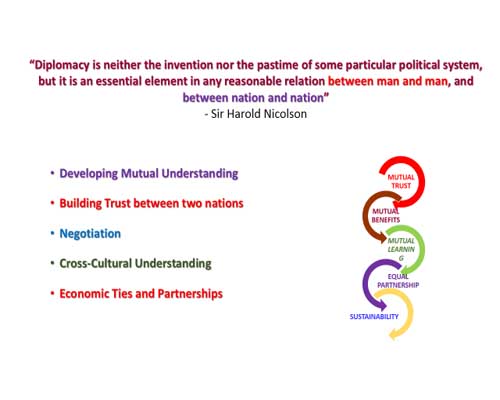
In generally, Diplomacy is the official relationship between two or more countries for various purposes such as economic, socio-cultural, political and security as well. Diplomacy can occur in a number of forms, or “tracks,” that engage various participants and stakeholders in different ways such as Heads of States, Policymakers & Administrators, Business leaders, Professionals & Academics, etc.
Rapid globalization has produced obvious changes in diplomatic purposes and practices. Changing the purposes of diplomacy created the concept of Multi-Track Diplomacy.
Multi-Track Diplomacy is a conceptual way to view the process of international diplomacy with different purposes in a very pragmatic system.It is the web of interconnected activities, individuals, institutions, and communities that operate together for a common goal in different nations or countries.
The multi-track system originated due to the inefficiency of pure government mediation (Joseph Montville, 1982). Furthermore, Multi-Track Diplomacy is an expansion of the “Track One and Track Two” paradigm. Track One Diplomacy is official government diplomacy whereby communication and interaction is between governments. Track Two Diplomacy is the unofficial interaction and intervention of non-state actors.Instead of these two tracks,a more interpersonal approach is needed focusing on the network of interconnected activities, individuals, institutions, and communities that operate together for a common goal by different countries.
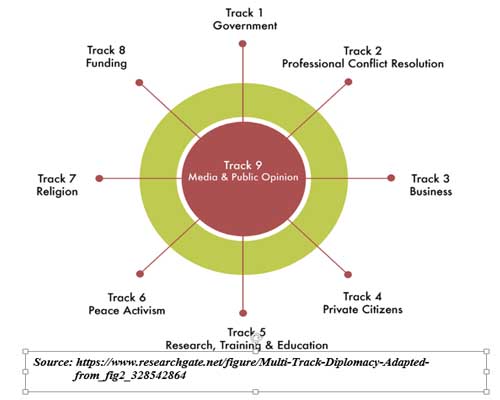
Such multi-track diplomacy can serve many purposes. It can help to incorporate grassroots and civil society participation when these groups have otherwise been excluded. It can maintain a channel of communication when officials are noteffectively communicateto each other. It can be used as a forum for discussing Actions and Outcomes-Based Policy Measures. Multi-Track Diplomacy can serve for (1) People to People Relationship, (2) Strengthening Harmony Processes, (3) International Policy Forum, (4) International Business and Trade and (5) Health and Disaster Management.
As a result, concerns on health and issues at different countries have become increasingly preeminent in the evolving global diplomacy agenda. Increasing demands on global health diplomacy require a delicate combination of technical expertise, legal knowledge, and diplomatic skills that have not yet been systematically cultivated among either Foreign Service of each country and global health professionals.
On the other hand, high expectations on health diplomacy at the health crisis like the Coronavirus COVID 19 health initiatives at global level would surely improve and diplomatic goals beyond conventional function will be changed in near future. Deepening links between health international relations and foreign policies require both the diplomatic and global health communities to reexamine the key functions of diplomacy.
It is Indeed the Need of Hour
Therefore, it is high time to rethink and redesign the function of diplomacy under the new Multi-Tracks concept in order to inspire a long-term international and multi-stakeholder collaborations between professionals and intergovernmental organizations for this type of COVID 19 Pandemic at global level. In such case, the following goals can be considered as primary goals:
- Identification and assessing the possible global disaster risk and its major drivers;
- Evaluation of existing practices and Capacity Threshold at this type of pandemic in global level
- Estimation the prevalent Resource Gaps at the prevention, resilience building and management of these types of disasters
- Establishment of communication channels between the relevant scientists, medical experts and other related professionals including community experts and policy and decision makers of governments and related global organizations.


